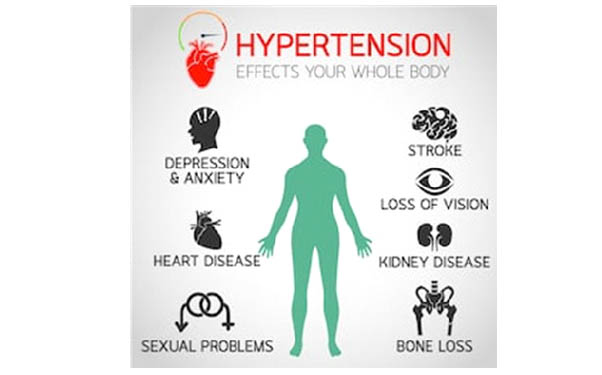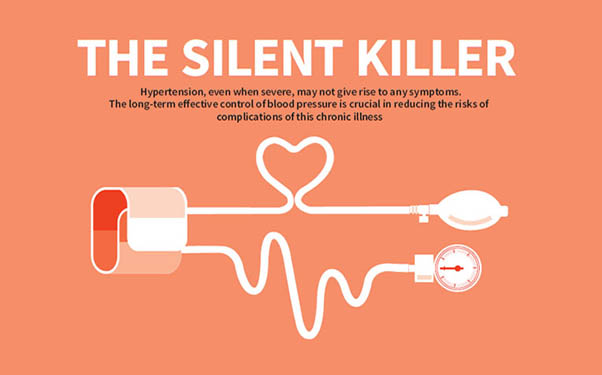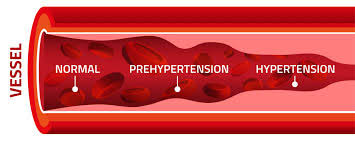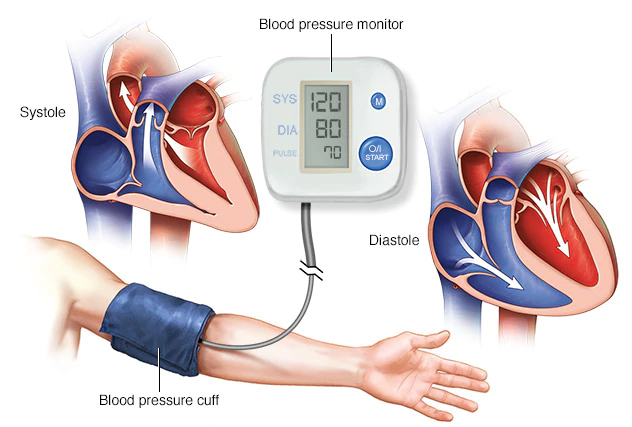HYPERTENSION
High blood pressure (hypertension) can increase your chance of developing heart disease, stroke, kidney failure and other serious conditions.
As a rule, the higher the blood pressure, the greater the risk.
Treatment includes a change in lifestyle and managing risk factors where these can be improved. For example, losing weight if you are overweight, regular physical activity, a healthy diet, cutting back if you drink a lot of alcohol, stopping smoking, and a low salt and caffeine intake.
If needed, medication can lower blood pressure but has to be taken lifelong.
Hypertension (High BP) is often termed the SILENT KILLER as it may not produce any symptoms until the day a devastating consequence such as a Stroke or Heart Attack happens as a consequence of long-standing, yet, undiagnosed High BP.


Therefore, it is important to have your BP checked regularly.
I would advise everyone over 40 years of age to invest in an automated BP monitor which is available in every drug store so that you can check your BP at home (Home monitoring) periodically.
The best time to check BP is 1 hour after waking up in the morning and 1 hour before going to bed.
You need to sit quietly or lie down for 5 minutes before taking a measurement.
| Systolic, Diastolic Blood Pressure (mm Hg) | JNC7 | 2017 ACC/AHA |
|---|---|---|
| 120–129 and <80 | Prehypertension | Elevated BP |
| 130–139 or 80–89 | Prehypertension | Stage 1 hypertension |
| 140–159 or 90–99 | Stage 1 hypertension | Stage 2 hypertension |
| > 160 or >100 | Stage 2 hypertension | Stage 2 hypertension |
What should I do if my BP is high?

The first step in managing high BP is identifying it is high.
It is important to measure BP on a number of occasions in the clinic or at home before deciding that you have high BP.
Once it is confirmed that you have sustained high BP, the first step is to try lifestyle modification unless it is very high at the very first instance in which case you will invariably need medications to control BP quickly and effectively to reduce the risk of stroke and heart attack.
What cause high BP?
There is a number of clinical conditions where blood pressure may be elevated such as kidney disease or some disturbance in hormone levels but most often there is no underlying illness and high BP itself is a disease entity that needs to be addressed on its own. This condition is called Essential Hypertension and is the commonest form of high BP seen in clinical practice worldwide.
What lifestyle modification do I need to do?
1) Reduce/ avoid salt in the food
2) Regular aerobic exercise
3) Stress management – Yoga and Meditation are good ways but you can choose your own way of relaxing- in between work and after work.
4) Low saturated fat diet/ Increase fiber, oily fish (salmon, sardines, etc), nuts and fruits instead.
5) STOP SMOKING
6) Moderate your alcohol intake
When do I need medications for High BP?
If you have sustained high BP on 3 separate occasions in clinic readings or on home monitoring, you are likely to need medications to bring down your blood pressure. The need to commence medications early is also influenced by your individualized risk factors and how high your BP is when first diagnosed.
How long will I need medications for High BP?
If you are diagnosed with hypertension and commenced on medications, you are likely to need them for life long unless you have a rare form of hypertension where there is an underlying cause (often termed SECONDARY hypertension) and this can be treated so that the hypertension is cured upon treating the underlying condition.
What medications should I take to control my high BP?
This is very much individualized based on your age, co-existing conditions, ethnicity, etc. So please do arrange a consultation and we can discuss this in great detail as you are likely to be on these medications for a long time. It is also important to ensure that the side effect profile is not too disturbing to your lifestyle as most drugs given to treat high blood pressure tend to have some or other side effects albeit mild.

